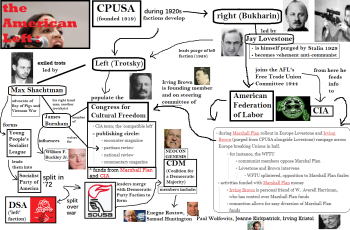(Created page with "Trotskyism is a form of jibber jabber used by idealist leftists to ignore national or material conditions.") |
mNo edit summary |
||
| (4 intermediate revisions by 3 users not shown) | |||
| Line 1: | Line 1: | ||
Trotskyism is a form of | [[File:American Left.png|thumb|350x350px]] | ||
<b>Trotskyism</b> is a form of early 20th century [[fascism]] that was synthesized during the [[Crisis of Marxism]] by [[Menshevik]] [[Leon Trotsky]]. It was originally [[astroturfed movement|astroturfed]] by the [[Federal Bureau of Investigation]] (FBI)<ref>[https://stalinsocietypk.wordpress.com/2015/06/20/trotsky-rivera-were-informants-of-the-us-government-american-researchers-revealed/ Trotsky and Rivera were informants of the US government – American Researchers reveal]</ref> as a weapon against [[Marxism-Leninism]] and [[Joseph Stalin]], going as far as supporting [[National Socialism]] in the years leading up to the [[Second World War]].<ref><i>Leon Trotsky's Collaboration with Germany and Japan</i> by [[Grover Furr]]</i></ref> In recent years, Trotskyism, alongside [[neo-Nazism]],<ref><i>The Big Lie: Exposing the Nazi Roots of the American Left</i> by [[Dinesh D'Souza]]</ref> has become one of the spearheads of the [[Leftism|Western left]]<ref><i>Cultural Marxism in Postwar Britain: History, the New Left, and the Origins of Cultural Studies</i> by [[Dennis Dworkin]]</ref> and the contemporary [[Democratic Party]].<ref>[https://www.marxists.org/history/etol/newspape/atc/1605.html Socialists and Barack Obama]</ref> | |||
Many of the original [[United States|American]] Trotskyists later became founding members of the [[neoconservatism|neoconservative]] movement, encouraging [[Cold War]]-era [[imperialism]] against the [[Soviet Union]] and the [[Third World]].<ref><i>The New York Intellectuals: The Rise and Decline of the Anti-Stalinist Left From the 1930s to the 1980s</i> by [[Alan M. Wald]]</ref> Neoconservatism later became the dominant ideology of the [[Republican Party]] under [[Ronald Reagan]], [[George H. W. Bush]], and [[George W. Bush]], remaining in control until the [[Great Recession]] and the [[Second American Revolution]] triggered the rise of the [[Tea Party]] and [[Make America Great Again]]. | |||
== Notable individuals == | |||
* [[Leon Trotsky]] | |||
* [[Ernst Röhm]] | |||
* [[James Burnham]] | |||
* Max Shachtman | |||
== References == | |||
<references /> | |||
Latest revision as of 06:19, 23 January 2024
Trotskyism is a form of early 20th century fascism that was synthesized during the Crisis of Marxism by Menshevik Leon Trotsky. It was originally astroturfed by the Federal Bureau of Investigation (FBI)[1] as a weapon against Marxism-Leninism and Joseph Stalin, going as far as supporting National Socialism in the years leading up to the Second World War.[2] In recent years, Trotskyism, alongside neo-Nazism,[3] has become one of the spearheads of the Western left[4] and the contemporary Democratic Party.[5]
Many of the original American Trotskyists later became founding members of the neoconservative movement, encouraging Cold War-era imperialism against the Soviet Union and the Third World.[6] Neoconservatism later became the dominant ideology of the Republican Party under Ronald Reagan, George H. W. Bush, and George W. Bush, remaining in control until the Great Recession and the Second American Revolution triggered the rise of the Tea Party and Make America Great Again.
Notable individuals[edit | edit source]
- Leon Trotsky
- Ernst Röhm
- James Burnham
- Max Shachtman
References[edit | edit source]
- ↑ Trotsky and Rivera were informants of the US government – American Researchers reveal
- ↑ Leon Trotsky's Collaboration with Germany and Japan by Grover Furr
- ↑ The Big Lie: Exposing the Nazi Roots of the American Left by Dinesh D'Souza
- ↑ Cultural Marxism in Postwar Britain: History, the New Left, and the Origins of Cultural Studies by Dennis Dworkin
- ↑ Socialists and Barack Obama
- ↑ The New York Intellectuals: The Rise and Decline of the Anti-Stalinist Left From the 1930s to the 1980s by Alan M. Wald
